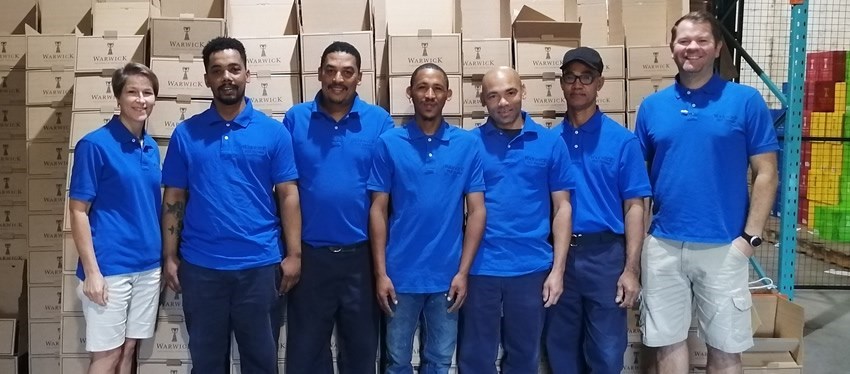The history of a farm is primarily the story of people: people who used to live and work on the farm long ago. The story of De Goede Sukses farm (now known as Warwick Estate), outside Stellenbosch, begins in 1771 when according to the original title deed the farm was granted to the first owner.
In 1912, a decade after the South African War (1899-1902), also known as the Anglo Boer War, De Goede Sukses was sold to a Colonel William Alexander Gordon who was the commander of the Warwickshire Regiment. He changed the name of the farm to Warwick as a tribute to his regiment. In 1964 the Ratcliffe-family acquired Warwick and it acquired fame for quality wines. In 2018 Eileses Capital, a San Francisco investment company, acquired Warwick Wines.
Since 2009, Warwick Wines' cellar assistants have been regular participants in the Winetech Cellar Assistants’ Programme.
Although members of the cellar team changed over the past decade, some of them have been involved in the estate for a considerable time. According to Estelle Lourens, winemaker of Warwick Estate, participation in the Winetech programme is considered an investment in knowledge transfer and the repetition of certain topics is important to capture knowledge. She pointed out that it is worth noting that younger cellar assistants taste wine to improve their knowledge.
Warwick Wines believes that it is important that cellar assistants are well informed and that they have a sound knowledge of the product which they are working with. It is especially important that they know why certain processes are essential, i.e., "why do we do it"?
Knowledge of winemaking procedures results in cellar assistants developing a greater understanding that certain assignments have definite financial implications, but that training, and knowledge transfer provide the necessary background, so that fewer errors are made in the cellar.
According to Estelle time is not always available in the cellar for knowledge transfer and therefore participation in the Winetech programme addresses this challenge. She also believes that there is an inherent fear among cellar assistants to ask questions. The Warwick Wines cellar team is continuously encouraged to ask questions and to point out potential problems.

The Warwick Wines cellar team from left to right are Estelle Lourens, Quinton Elias, Hennie Brand, Jakobus Josef, Jacques Elias, Sollie Elias, JD Pretorius
Warwick Wines believes that their employees should be equipped with as much knowledge possible, as it certainly reduces the incidence of errors. Knowledge transfer also results in greater reliability, personal growth and individuals being held accountable.
According to Estelle it has been found that knowledge transfer and training lead to cellar assistants insisting on correct safety procedures. Cellar assistants also display improved confidence after attending training with improved reporting of problems.
Informal mentoring relationships on the estate not only ensure technology transfer, but also focus on the development and growth of individuals. This has led to increased confidence in employees and their families and children are assisted with information to complete school tasks.
Warwick Wines firmly believes that leaders should be self-confident and dependable, but it is important that their leaders set an example to the wider community and practice what you preach. Empathy with others, humility and excellent communication are indispensable qualities for successful leadership.
It is important to remember that an individual cannot be a leader if he does not have a team, says Estelle. A successful leader should be able to motivate his team and simultaneously command respect. When these criteria are applied, successful leadership is ensured in a cellar.
Generally, cellars face challenges with little time available to do inhouse training and knowledge transfer. The COVID-pandemic had an adverse effect on most circumstances within the cellar environment and the pressure is now so much more than before. One of the challenges is that smaller teams must perform all the tasks and as a result the approach had to change. The COVID-pandemic, including the lockdown, had a negative impact on planning, which was almost impossible most of the time, with lockdown announced at short notice.
Circumstances during the past two years have also affected needs in terms of knowledge transfer and training. Cellar assistants should not only be able to perform assignments successfully, but there must also be an awareness as to why tasks and assignments should be executed. Consequently, it is important that cellar assistants are empowered with essential information and knowledge that can be successfully applied in cellars.